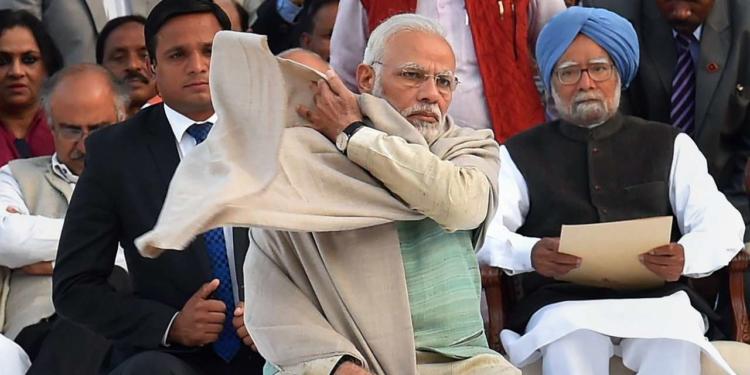In the past six weeks, the petrol price has been cut by around Rs 10 per litre and diesel by around Rs 8. Diesel is now at its lowest price in the last 3 months while the petrol price is at an 8-month low level.
When fuel prices went up, all TV studios were shouting against Modi government and opposition leaders also cursed PM Modi, but today prevails a stunning silence. The media sensationalised the issue of price hike and hyped it out of proportion. The worst thing was that there were no reports on how the global factors contribute to the price rise in domestic markets and which the government has no control of. Modi government had cut the taxes on petrol and diesel by 2.50 rupees per litre on October 4 in order to provide some relief to the common citizens. Many BJP-ruled states like Maharashtra went on to cut the prices by the same amount to provide further relief to people of the state. However, governments and experts understand that the oil prices domestically are subject to crude oil prices in international markets and therefore, the real relief came after the prices started to decline in the international markets. Crude oil prices are witnessing a continuous decline since it touched its peak in the month of October. Crude oil prices have reduced by over 30 percent since then.
Petrol prices in Mumbai are lower than what it was in April 2014 when Manmohan Singh was still the PM.
Petrol prices in Mumbai are lower than what it was in April 2014 before Modi govt. took over..complete silence in media & on social media pic.twitter.com/QwT9KAmrBn
— Nilesh Dhanecha 🇮🇳 (@nddhanecha) November 29, 2018
After Saturday’s price cut, petrol became cheaper by about 30-36 paise, while diesel prices came down by about 37-40 paise per litre in major cities of the country.
In Delhi, petrol prices stand at Rs 72.53 as against Rs 72.87 on Friday. The price of diesel in Delhi is at Rs 67.35 as against Rs 67.72 on Friday.
Last 10 Days Petrol & Diesel Price pic.twitter.com/uqqujfUMWm
— Tajinder Bagga (Modi Ka Parivar) (@TajinderBagga) November 28, 2018
In Noida, petrol is priced at Rs 71.90 and diesel at Rs 66.25. Petrol and diesel are cheaper in UP than Delhi.
https://twitter.com/Abhina_Prakash/status/1068111885822701568?s=19
According to this Twitter user, today petrol prices in UP are 11 Rupees less as compared to September 2013.
Petrol Prices in Noida on Sept 2013 – Rs 83.63
Petrol Prices in Noida today ie 29 November 2018 – Rs 72.54The petrol prices in UP today are below the 2013 level. by whopping Rs 11/litre pic.twitter.com/XJrMrzP4Jc
— Rishi Bagree (@rishibagree) November 29, 2018
In Chennai, petrol on Saturday was sold at Rs 75.26 as against Rs 75.62 on Friday while diesel in the city is retailing at 71.12. Other major cities also witnessed a similar decline in fuel prices.
The decline in crude oil prices has been a major relief for India since it imports over 80 percent of its crude oil requirements. If the crude oil prices continue to show a declining trend then in the days to come, petrol and diesel would become cheaper.
Petrol Prices in Mumbai when Manmohan Singh Sworn in as PM
May 2004 – 40.96Petrol Prices in Mumbai when Manmohan Singh Govt exited
March 2014 – 82.07Petrol Prices in Mumbai today
1st Dec 2018 – 78.09 pic.twitter.com/SDrZFRa7fI— Rishi Bagree (@rishibagree) December 1, 2018
Amid reduction in the fuel prices, mainstream media houses and issue hungry political parties have maintained a silence and do not seem to acknowledge the decline in fuel prices. It seems that they just want to debate about the hike in fuel prices but not its decline. The short-sighted and ideologically polarized anchors and journalists, particularly, in English media reported the rise in petrol prices in a way as if the macroeconomic condition of the country had deteriorated to an unimaginable extent and the biggest problem that the people ever face in a country is the rise in petrol prices. Indian media exaggerates every issue and the TV shows lack mature content. The Prime Time shows on TV give a sense that the world will fall apart on just the other day. The media needs to behave more responsibly and should have the national interest in the top of their priority list.
























